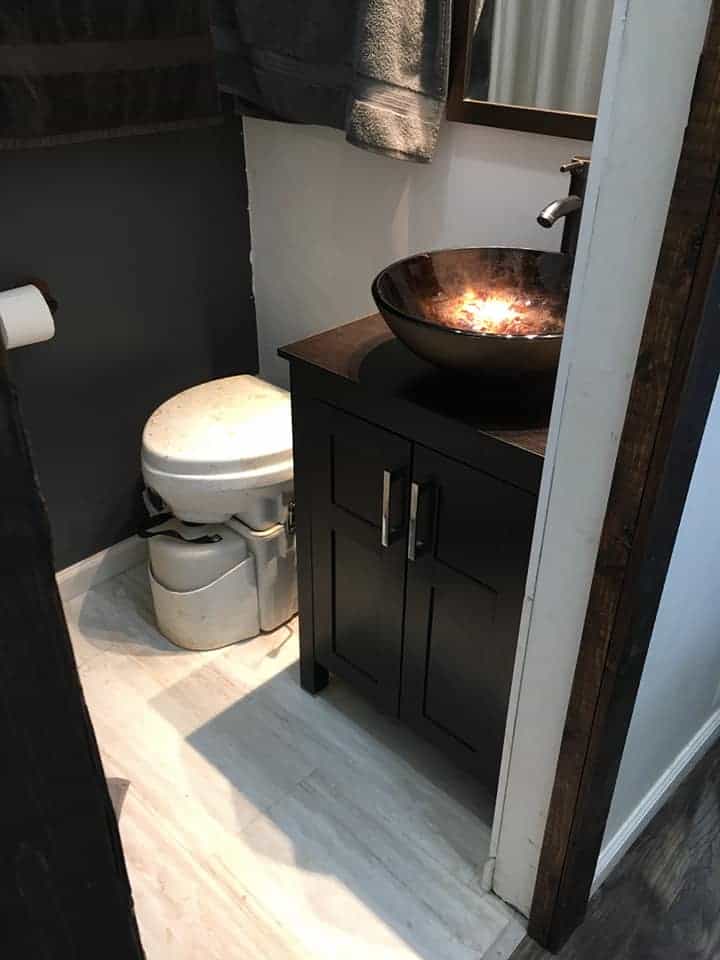
This article has been reviewed in accordance with our editorial policy.
One popular question that we get a lot is how our toilet works in a tiny house. There are a few different options for toilets in tiny houses, let’s look at those.
So, do all tiny houses have composting toilets? Not all tiny houses have composting toilets. These are best for extensive travel or living off-grid. But there are a few other toilet options in tiny houses.
My husband and I have been living off-grid in a tiny house for several years now and we have always used a composting toilet. But I wanted to go through some other options as well along with the pros and cons, to help you make the most informed decision.
Toilet Options in Tiny Houses
As I mentioned there are several options for toilets in tiny houses. The most common are either composting or a regular flush toilet. There is another option of an incinerator toilet, which burns anything in it.
There are different pros and cons to these options, which I will cover in more detail in the following sections. A tiny house can have many functions. Some are just used as a regular house, even if they are on wheels.
Many tiny houses are just left in a permanent location and are setup essentially like a normal house. You can use a regular toilet and have a full size fridge and whatever else you want in your home.
Other tiny houses are meant to be mobile. These houses may stay in the same spot for a while and then move, or people may travel in them constantly. There are a myriad of reasons that people buy tiny houses and they can all be set up differently.
Composting Toilets
When you think of a tiny house toilet, composting toilets are often the ones that come to mind. Many tiny houses have composting toilets. I think that these have recently been much more popularized because they work so well in tiny house, especially ones on wheels.
Composting toilets work by separating liquids and solids. The liquids go into a removable container that is regularly emptied. And the solids go into a separate container filled with some sort of composting material (most common is peat moss), and is then emptied separately.
Composting toilets offer several advantages. They are easy to install and take out, they do not require any black water tanks, and they are very mobile friendly. This is perfect for a tiny houser on the move.
There are disadvantages as well. One being that these toilets, even though they are quite simple, are not cheap. For a toilet, they are pretty pricey. Although you do not need to buy the typically plumbing and black water tanks a normal toilet would require.
Additionally, the disadvantages are that you need to empty their components on a regular basis. Around once a week for liquids and once every four to six weeks for solids. Although the solids all turn into compost and should not have a bad smell, it can still be gross for some people.
Finally, most people are concerned about whether or not it smells. If it is used properly it does not smell. There are hoses and fans that allow air flow and this eliminates pretty much all of the smell. It is also important to use the right type of compost and empty it regularly to avoid any odors.
Overall, composting toilets are great if you plan on traveling and do not want to constantly drive your house to a dump and empty a black water tank. We have been living off-grid for several years and this has been a great option for us.
Regular Flush Toilets
Regular flush toilets are very popular in tiny houses for several reasons. If you are living full time in your tiny house, and it is on a permanent location, then this option is ideal. A tiny house can still be a regular house, just smaller.
This option would be less advantageous if you were constantly moving. However, if you only moved once every year or so, this would still be a great option. Since these toilets hold water you would just need to prepare your toilet for travel.
The advantages for this option includes the price of the toilet. Now take that with a grain of salt. Although the toilet is cheaper, you will need to buy additional plumbing and a black water tank. It may not actually be any cheaper.
You do not have to have a black water tank if you are located on a permanent location and can tie your house directly into the sewage system. If this is the case than one of these toilets will be cheaper.
Many people want their tiny house to feel like a regular home and thus they want a normal toilet. Plus everyone already knows how to use them!
The major disadvantage would be if you are looking to travel or move a lot in your tiny house. You would have to constantly travel to a dump station and that process is not always pretty either, not to mention you have to pay for it.
You may be wondering why I didn’t mention a RV toilet as an option. RV toilets are similar to regular toilets, they are just smaller and do not hold water in them. I have not seen anyone use one of these in their tiny house. People would typically rather have a regular toilet or a composting one, to avoid the black water tanks.
Incinerator Toilets
Incinerator toilets are becoming more popular and may be a good option in a tiny house. There are some important factors to take into account before deciding to buy one for your house.
Incinerator toilets work by torching everything inside of them. They will burn liquids and solids. They are set up to vent smells directly outside. Every so often you will need to empty the ashes.
Disadvantages of having an incinerator toilet is again the price and having to empty something. You do avoid having a black water tank, which can be great especially when traveling.
However, these toilets have an additional problem. They use lots of power to run. Most solar systems in a tiny house will not support the power load they consume. We have seen one of these toilets completely shut down the electricity in a house before, just from one use!
The advantage is not having sewage or compost. This would not be a good option if you are living off-grid, unless you have an extensive system set up. This would also be difficult if you use an off-grid system during travel.
For several reasons, incinerator toilets are much less common. It is easy to use a regular toilet and it uses much less energy to use a compositing option. However, they can be a good option if you are not concerned about power and do not want sewage.
Related Questions
Do you pee in a composting toilet? Composting toilets separate liquids form the solids, so you still pee in them. The toilet is designed to separate these into different containers, which are emptied separately.
Do you pee in an incinerator toilet? Incinerator toilets torch everything in them, they will burn solids and liquids. Some of them have two settings and you can select liquid or sold waste when burning.

